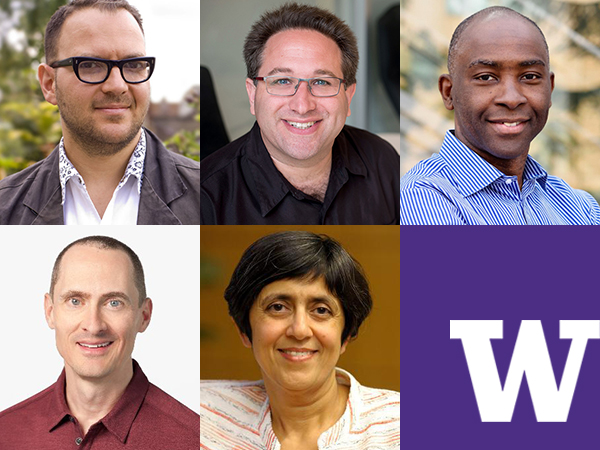
Save the dates! Another exciting season of the Allen School’s Distinguished Lecture Series kicks off on Oct. 29. Join us to hear experts in technology activism, quantum computational supremacy, multi-chip processing, cloud infrastructure, and computer architecture.
All lectures with the exception of the November 19th Lytle Lecture, will be live streamed on the Allen School’s YouTube channel at 3:30 p.m. Pacific Time on the presentation date.
Oct. 29: Cory Doctorow, journalist, activist, science-fiction author
Cory Doctorow, an author of science-fiction and non-fiction books, a journalist and technology activist, will deliver a talk on Oct. 29 about “Early-Onset Oppenheimers.” His presentation will highlight the liberatory power technology workers have in what they design, build and share with the public, and how to convince these workers to use their power to deliver the same liberation to their users, rather than confiscating their users’ freedom.
Doctorow, who created craphound.com, champions liberalizing copyright laws and co-founded the UK Open Rights Group. He works in digital rights management, file sharing and post-scarcity economics. He has written more than 20 books and has published an extensive collection of short stories and essays. He is a contributing writer to Wired magazine, The New York Times Sunday Magazine, The Globe and Mail, Asimov’s Science Fiction magazine, and the Boston Globe. Doctorow is the former European Director of the Electronic Frontier Foundation and is an MIT Media Lab research affiliate, a visiting professor of computer science at Open University, and a visiting professor of practice at the University of North Carolina’s School of Library and Information Science.
Nov. 19: Scott Aaronson, David J. Bruton Centennial Professor of Computer Science and founding director, Quantum Information Center at the University of Texas at Austin
Scott Aaronson is the Department of Electrical and Computer Engineering’s 2020 Lytle Lecturer and will deliver a talk on Nov. 19 about “Quantum Computational Supremacy and its Applications.” He will discuss Google’s first-ever demonstration of Quantum Computational Supremacy, which is a 53-qubit programmable superconducting chip called Sycamore. His talk will address questions about the chip, such as what problem Sycamore solved, how to verify the outputs using a classical computer, and how confident researchers are that the problem is classically hard — especially in light of subsequent counterclaims by IBM and others.
Aaronson focuses on the capabilities and limitations of quantum computers as well as computational complexity in general. His most recent work aims to demonstrate the quantum computing speedup that future technologies will help to create. In addition to his research, Aaronson writes about quantum computing for Scientific American, The New York Times, and on his own popular blog, Shtetl-Optimized. Prior to joining UT Austin, Aaronson spent nine years as a professor in electrical engineering and computer science at MIT. During that time he wrote his first book, Quantum Computing Since Democritus, about deep ideas in math, computer science and physics.
The Lytle Lecture will be broadcast via Zoom. When available, the link will be posted here.
Dec. 3: Kunle Olukotun, Cadence Design Systems Professor in the School of Engineering and professor of electrical engineering and computer science at Stanford University
Known as the father of the multicore processor and the leader of the Stanford Hydra chip multiprocessor (CMP) research project, Kunle Olukotun has been a trailblazer in processor design. He founded Afara Websystems, a company that built high-throughput, low-power multicore processors for server systems, saving power and space for data centers which was subsequently acquired by Sun Microsystems. Olukotun is actively involved in research in computer architecture, parallel programming environments and scalable parallel systems, and he currently co-leads the Transactional Coherence and Consistency project aimed at making parallel programming accessible to average programmers. He has designed multicore CPUs and GPUs, transactional memory technology and domain-specific languages programming models. He also directs the Stanford Pervasive Parallelism Lab (PPL) which focuses on the use of heterogeneous parallelism in all application areas using domain specific languages.
Dec. 10: Brad Calder, vice president of Product and Engineering of Technical Infrastructure and Cloud at Google
Allen School alumnus (B.S. ‘91) Brad Calder is the Vice President of Product and Engineering of Technical Infrastructure and Cloud at Google. There, he oversees the computer, networking, storage, databases, and data analytics services to provide customers more ways to connect to Google’s cloud computing services. Prior to joining Google, Calder was a vice president of engineering at Microsoft Azure and was on the founding team that started Azure in 2006. Before that, Calder was a tenured professor in the University of California, San Diego’s Department of Computer Science and Engineering, where he published over 100 papers in the areas of systems, architecture and compilers and co-directed the High Performance Processor Architecture and Compilation Lab.
Feb. 11: Sarita Adve, Richard T. Cheng Professor of Computer Science at the University of Illinois at Urbana-Champaign
With research interests that span computer architecture, programming languages, operating systems and applications, Sarita Adve has devoted her career to advancing innovation at the hardware-software interface. Adve co-developed the memory models for C++ and Java programming languages, based on her work in data-race-free (DRF) models, and has made significant contributions to cache coherence, hardware reliability, and the exploitation of instruction-level parallelism (ILP) for memory level parallelism. She also led the design of one of the first systems to implement cross-layer energy management as well as the development of the widely used RSIM architecture simulator. Her current research focuses on scalable system specialization and approximate computing. Adve was the first woman of South Asian origin to be named a fellow of the Association for Computing Machinery, and was the first woman to earn a career award for computer architecture research when she received the ACM SIGARCH Maurice Wilkes Award.
For more details and future updates, be sure to check out our Distinguished Lecture Series page. And please plan to join us online!

